About the Program

2 Year Program
Our program is a 2-year course of study, with the flexibility to slow down if needed. Students can adjust the pace of their education to accommodate personal or professional commitments while still receiving a comprehensive training experience.
Click here for more information
Fully Face-To-Face
Our fully face-to-face program offers students an immersive, in-person learning experience that fosters direct interaction with instructors and peers for hands-on training and collaborative learning.
Click here for more information
COAMFTE accredited since 2006
Our program is accredited by COAMFTE (Commission on Accreditation for Marriage and Family Therapy Education), ensuring it meets high standards of quality and prepares our students for professional practice in the field.
Click here for more information
Direct Client Contact
Students complete a total of 500 direct client contact hours and over 100 supervision hours. Most of these hours are earned at the on-site clinic, FamilyWorks, where students gain hands-on experience providing therapy under professional supervision.
Click here for more information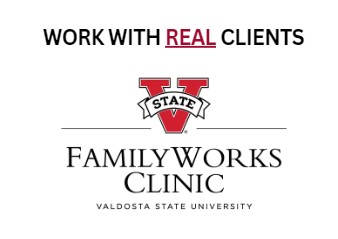
On Campus Clinic
FamilyWorks trains graduate students in relational thinking (sometimes called systems thinking), and provides brief therapy to families, couples, and individuals who come from all over south Georgia and north Florida.
Click here for more information
60 Credits Hours
Our program consists of a total of 60 hours. 42 hours of didactic instruction and 18 hours of supervised practice. This blend of theory and hands-on experience prepares students for effective therapy practice
Click here for more information
Employment Growth
The need for therapists in many US states, including Georgia, are at an all-time high. Employment of Marriage and Family Therapists is on the rise
Click here for more information
History of MFT
History of MFT in Georgia as told by Carl Johnson, one of its founders
Click here for more information2023-24 Faculty and Student Demographics
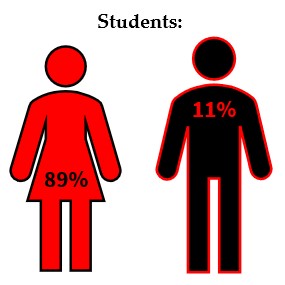 |
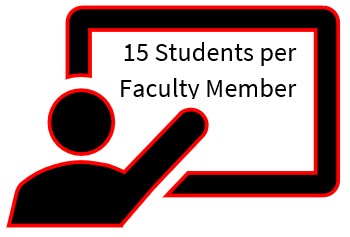 |
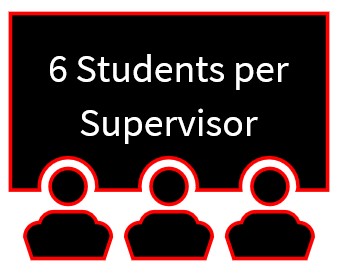 |
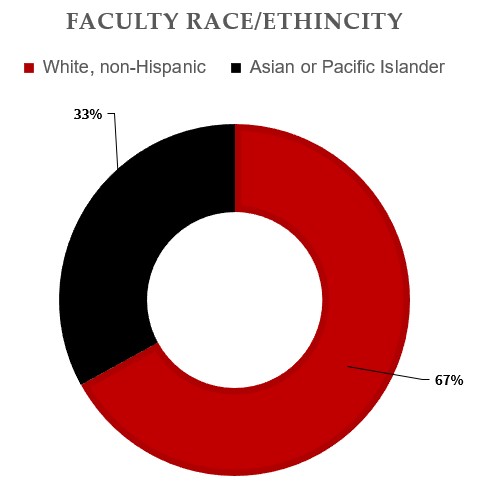 |
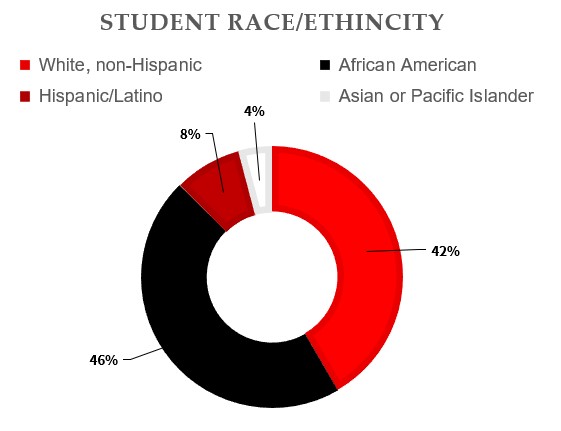 |
Important Program Policy Information
The MFT Program policy on diversity aligns with the Valdosta State University Policy on Non-Discrimination, the MFT Program mission, goals, and student learning outcomes (see above tab), and the COAMFTE Accreditation Standards V12.5 definitions of diversity and diverse, marginalized, and/or underserved communities (p. 33-34).
It is in the best interests of our clients, ourselves, and society as a whole that diversity is held as a core value. This means that we follow paths that connect, rather than separate people. Family therapy training and practice are relationally connective in nature. Valuing the myriad ways that we humans are both different and the same is at the heart of diversity. In the course of our work, family therapists engage in connective activities—sense-making, metaphoric and narrative understanding, and constructing contextually-driven stories. Embracing diversity is, by its nature, inclusive, connective. In fact, inclusive thinking and acting are unable to be separative or oppositional. Racism, heterosexism, classism, religious discrimination, and other “isms,” on the other hand, are always separative, intended to set a group of people apart and away. The “other”—that “other” race, that “other” sexual orientation, that “other” class, that “other” religion—are established as exclusions to a preferred default race, sexual orientation, class, or religion. Estrangement and hate are forged through separation. Love, understanding, respect, appreciation, safety and a strong multicultural and diverse educational environment are forged through connection.
The faculty of the VSU MFT program regard issues of diversity to be of utmost importance in the training and practice of family therapists. Thus, the MFT Program is committed to ensuring that issues of diversity are woven throughout the MFT educational environment in coursework, practica, internships, and student/faculty relationships. We strive to teach students that problems and clients’ attempts to solve problems make sense when viewed through relevant contexts such as age, culture, environment, ethnicity, gender, health, physical ability, nationality, race, religion, sexual orientation, spirituality, socioeconomic status, and languaged meaning. These give shape and meaning to clients’ lives. That these contexts are embedded in more encompassing cultural contexts of privilege, power, subjugation, and susceptibility is a notion that is infused throughout the entire curriculum. The program emphasizes the way these contexts inform human experience and meaning systems, giving rise to multiple perspectives.
It is a foundational premise of this program that mere tolerance of difference (which is often based on class, race, gender, sex, gender expression, gender identity, religion or non-religious age, ethnicity, nation of origin, immigration status, language abilities, sexual orientation, veteran status, socioeconomic status, spirituality, physical or mental disability, health status, and political beliefs) is wholly insufficient. The differences that make up the rainbow weave of humanity are most properly embraced, cherished, and celebrated. Mary Catherine Bateson (1994, Peripheral Visions) reminds us that insight is “that depth of understanding that comes by setting experiences, yours and mine, familiar and exotic, new and old, side by side, learning by letting them speak to one another (p. 14).” After all, “it is," she goes on, “contrast [the relationship to 'otherness'] that makes learning possible” (p. 27).
The relationship between diversity and the variety of dominant cultural discourses such as ageism, classism, racism, sexism, heterosexism, and gender are woven throughout the fabric of our curriculum. MFT faculty members strive to explore with students the ways that cultural and institutionalized discrimination are embedded in culture and language. We examine how issues of diversity and discrimination shape the context of therapy and exacerbate the treatment issues that clients present. By the time students graduate from our program, they are able to situate themselves in the relational web of issues—class, privilege, and disenfranchisement—often at work in the therapy room.
Appreciation for the unique perspectives, life experiences, and values of clients, students, and faculty members is a prerequisite for respectful and safe relationships, whether in treatment, with colleagues, or in our personal lives. Based on the above diversity statement and in alignment with the Valdosta State University mission and the MFT Program mission, it is the program’s responsibility to provide non-discriminatory services to clients (see AAMFT Code of Ethics, Standard 1.1). Faculty and students are expected to work with any family, couple, or individual seeking services at FamilyWorks or an internship. Students do not have the option to opt out of work with clients based on discriminations of class, race, gender, sex, gender expression, gender identity, religion or non-religion, age, ethnicity, nation of origin, immigration status, language abilities, sexual orientation, veteran status, socioeconomic status, spirituality, physical or mental disability, health status, or political belief. The Valdosta State University MFT program subscribes to the following:
- Clients have a right to treatment that is “without discrimination on the basis of race, age, ethnicity, socioeconomic status, disability, gender, health status, religion, national origin, sexual orientation, gender identity or relationship status.” (AAMFT, 2015, Ethical Standard 1: Responsibility to Clients)
- We believe that to be successful, MFT’s must possess therapeutic curiosity, be aware of ethical and therapeutic limitations, have a genuine interest in their clients, and be willing to talk openly about anything a client might wish to discuss, regardless of age, ethnicity, cultural background, national origin, spiritual belief and/or affiliation, relationship status, socio-economic status, health status, disability or physical limitation, political leanings, and level of education.
- The MFT faculty believe that person-to-person relational connection is the best way to forge and deepen understanding, respect, safety, cultural humility, and appreciation for those we view as different from ourselves. We are committed to teaching courses that often ask students to participate in difficult or uncomfortable discussions about race, culture, class, sexuality, or that bring out differences in political belief. We assume that our students are able to engage respectfully in such conversations, orienting themselves toward listening and hearing, rather than debate, persuasion, or contest. We assume that our MFT students can and will conduct themselves with patience, fairness, maturity, and thoughtfulness.
- The MFT program requires prospective students to read and give thoughtful consideration to the above diversity statement, then attest to their willingness and ability to adhere to the statement in an email to the Program Director. This attestation is retained in the student's permanent file. If a student finds conflict with the statement or personal beliefs preclude him or her from working with certain categories of clients, this program may not be a good fit, and the faculty will suggest that the student seek training elsewhere.
MFT PROGRAM MISSION
In concert with the Valdosta State University mission and its embrace of service learning,
safety, respect, community collaboration, creativity, social justice, and sustainability, the
mission of the Marriage and Family Therapy Program is to provide students with in-depth
knowledge and understanding of the interconnected, interrelated, and systemic nature of the
world, particularly as these pertain to the formation and resolution of human problems. This
systems theoretical knowledge-base forms the epistemological foundation upon which
students acquire an MFT identity and develop the clinical skills necessary to therapeutic
practice that is ethical, grounded in research, multi-culturally competent, and readies students
for employment in a variety of mental health settings with a diverse range of clients.
MFT PROGRAM GOALS (PG)
PG 1. Diversity: The program will demonstrate that graduates consider ethnicity, race, gender, socioeconomic status, and culture in clinical work.
PG 2. Knowledge: The program will demonstrate that graduates have a master’s level understanding of systems theory, relational/contextual thinking, and the ability to apply a systems/relational orientation to the assessment and treatment of clients.
PG 3. Practice: The program will demonstrate that graduates have the clinical competencies and personal qualities necessary to gain employment in a variety of mental health settings.
PG 4. Professional MFT Identity: The program will demonstrate graduate readiness to assume the identity of a professional Marriage and Family Therapist
PG 5. Research: The program will demonstrate student understanding of the way research informs relational family therapy treatment.
PG 6. Ethics: The program will demonstrate that graduates understand and apply a systemic ethic and the AAMFT Code of Ethics to clinical work.
These program goals are informed by the five developmental competencies identified by COAMFTE (Accreditation Standards 12.5): 1) Knowledge of the MFT profession, 2) Practice of relational/systemic therapy as a qualified behavioral/mental health provider, 3)Commitment to ethical practice through ethical codes of the MFT profession and pertinent regulatory bodies 4) Awareness, knowledge and skill to responsibly serve diverse communities 5) Development and application of research to further the knowledge and practice of the MFT profession
MFT PROGRAM STUDENT LEARNING OUTCOMES (SLO)
SLO 1. Practice from a multi-culturally sensitive lens
SLO 2. Practice from a systemic lens
SLO 3. Be prepared to obtain entry-level employment in mental health settings
SLO 4. Claim the professional identity of a Marriage and Family Therapist
SLO 5. Recognize the ways research informs relational family therapy treatment
SLO 6. Practice informed by ethics
COAMFTE ACCREDITATION STANDARDS 12.5 ALIGNMENT BETWEEN PROGRAM GOALS, STUDENT LEARNING OUTCOMES, TARGETS AND ASSESSMENT MECHANISMS.
MFT Program Handbook
MFT Program Policies
Policy on Addressing Academic DifficultiesPolicy on Admission
Policy on Advising
Policy on Anti-Discrimination
Policy on Assessment Plan and OBE Framework
Policy on Assessment, Grading, Academic Standards, & Regulations
Policy on Authentic Work and Academic Integrity
Policy on Background Checks
Policy on Child Abuse Reporting
Policy on Codes of Conduct, Ethics, and Diversity
Policy on Comprehensive Exams
Policy on Concerns, Complaints, Grievances, and Appeals
Policy on Course and Curriculum Changes
Policy on Degree Portability
Policy on Diversity
Policy on Faculty and Staff Sufficiency
Policy on Faculty and Student Governance
Policy on Faculty Office Hours
Policy on Faculty Roles, Qualifications, and Evaluation
Policy on Fiscal and Physical Resources Review
Policy on FERPA
Policy on Graduation
Policy on Grief Absences
Policy on Guns on Campus
Policy on Hiring Graduate Assistants
Policy on Minors on Campus
Policy on PD and CD Evaluation
Policy on Policies
Policy on Practicum and Internship
Policy on Program Leadership and Governance
Policy on Remediation and Dismissal
Policy on Security and Privacy
Policy on Student Recruitment
Policy on Student Retention
Policy on Supervisor Qualifications, Roles, and Responsibilities
Policy on Supervisor Sufficiency
Policy on Teaching-Learning Practices Review
Policy on Technical Training for Students, and Supervisors
Policy on Technology Requirements
Program Newsletter
Marriage and Family Therapy
-
903 N. Patterson St.
Valdosta, GA 31698 -
Mailing Address
1500 N. Patterson St.
Valdosta, GA 31698 - MFT Program
- Phone: 229.219.1281
- FamilyWorks
- Phone: 229.219.1281
- FamilyWorks Fax
- Fax: 229.219.1280